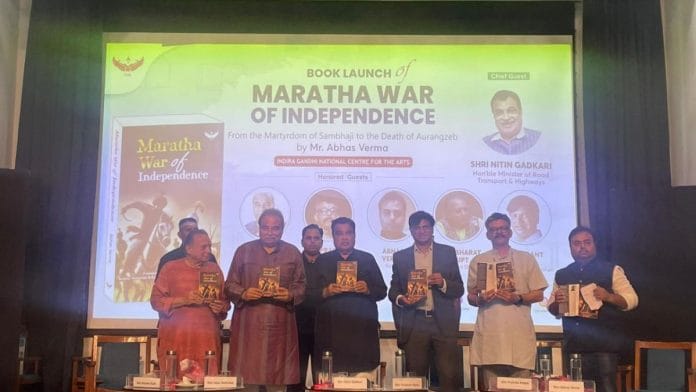New Delhi: When the Duke of Wellington, Arthur Wellesley, was asked about his favourite campaign, his answer was not defeating France’s Napoleon Bonaparte at the Battle of Waterloo. He instead recounted his victory against the Maratha Empire in 1803, according to author and historian Uday Mahurkar.
“Everyone knows about Waterloo, but the main hero [Wellesley] himself is saying that the Battle of Assaye is his most memorable victory,” said Mahurkar, highlighting the underestimated might of the Maratha Empire. He was speaking at the book launch of Abhas Verma’s Maratha War of Independence at the Indira Gandhi National Centre for the Arts in New Delhi.
The audience – a mix of journalists, historians and academics – was on its toes when Nitin Gadkari, Minister of Road Transport and Highways, walked into the auditorium with a retinue of armed guards. He joined Mahurkar and Verma on stage as the chief guest for a panel discussion, which included Prafulla Ketkar, Editor of Organiser Weekly, Padma Shri-awardee and scholar Bharat Gupt, and Sankrant Sanu, founder of Garuda Prakashan, the book’s publisher.
Although the Maratha War of Independence focuses on Marathas’ resistance against the Mughal Empire after the execution of Chhatrapati Sambhaji, Gadkari paid homage to the empire’s founder, Chhatrapati Shivaji.
“Chhatrapati Shivaji Maharaj’s ideas are stronger than lithium-ion batteries; they can never be depleted,” said Gadkari.
Shivaji laid the foundation of ‘Hindavi Swarajya’, a model of governance rooted in justice, equality, and cultural pride, stressed Gadkari. Moreover, he added, the Maratha ruler was an ideal father, son, administrator and warrior. “That is why we talk about him as God.”
Finding lost truths
The common thread linking each panellist’s brief speech on the podium was a need to both understand and promote India’s rich history, one that had been distorted by the British Empire.
“Every Englishman, writer, journalist, poet would write in their diaries,” remarked Nitin Gadkari, adding that because of this habit, whatever they wrote would be recorded as history. “It is our misfortune that our kings did not have records, and so gradually the truth was lost.”
Sankrant Sanu explained that this was the reason he founded Garuda Prakashan – to promote Indic voices that had been suppressed in the past. He also pointed out the irony of having the book launch at the Indira Gandhi National Centre for the Arts, on the 50th anniversary of the Emergency.
“If a civilisation is unable to tell its own stories, it will be unable to survive,” said Sanu, an ex-Microsoft employee who has published close to 300 books since Garuda Prakashan was launched in 2017. “There are enough people out there who want to read these stories and write them.”
Also read:
‘First war of Independence’
Abhas Verma decided to write about the period between 1689 and 1707. In this period, the Maratha resistance to Mughal rule included fort defences and guerrilla campaigns, often led by local warrior groups such as the Nayaks and Berads.
“This war started the process of the final disintegration of the Mughal empire with Aurangzeb’s death in 1707, and laid the foundation of the Maratha empire,” said Uday Mahurkar, adding that the Marathas then controlled the Mughal throne in Delhi for almost 50 years. “It is time to make sure that the original history of Bharat is revived.”
Mahurkar went on to highlight the campaigns of two Maratha warriors – Santaji Ghorpade and Dhanaji Jadhav – who “Aurangzeb was scared of”. It was these incidents, these acts of valour unknown to most people, which convinced Mahurkar that this period of resistance should be termed as the nation’s first war of Independence.
But Prafulla Ketkar, Editor of Organiser Weekly, politely disagreed. To him, the wars of Independence form the very fabric of India’s history.
“Bharat’s history is not the history of losing wars but a history of continuous sangharsh (conflict),” he said. “We have been fighting wars of Independence since Maharana Pratap.”
The crowd, led by journalists from Ketkar’s publication, erupted in raucous applause at the editor’s response. He then highlighted that many warriors dreamed of an Independent nation at a time when they had neither wealth nor arms. But they fought regardless.
Gadkari closed the discussion by requesting members of the panel to leverage social media and technology to learn about India’s history and culture, and the “swarajya ideas” of Shivaji. He remarked that people don’t read books anymore, but engage with platforms like YouTube. His own channel on the video streaming platform draws positive responses from viewers as far away as the United States.
“It is important to present our truth, our history, to the next generation in ways they can understand.”
(Edited by Zoya Bhatti)






